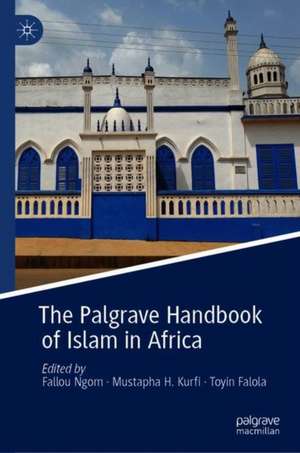The Palgrave Handbook of Islam in Africa
Editat de Fallou Ngom, Mustapha H. Kurfi, Toyin Falolaen Limba Engleză Hardback – 27 sep 2020
| Toate formatele și edițiile | Preț | Express |
|---|---|---|
| Paperback (1) | 1403.98 lei 6-8 săpt. | |
| Springer International Publishing – 27 sep 2021 | 1403.98 lei 6-8 săpt. | |
| Hardback (1) | 1410.63 lei 6-8 săpt. | |
| Springer International Publishing – 27 sep 2020 | 1410.63 lei 6-8 săpt. |
Preț: 1410.63 lei
Preț vechi: 1720.28 lei
-18% Nou
Puncte Express: 2116
Preț estimativ în valută:
269.92€ • 294.12$ • 227.45£
269.92€ • 294.12$ • 227.45£
Carte tipărită la comandă
Livrare economică 23 aprilie-07 mai
Preluare comenzi: 021 569.72.76
Specificații
ISBN-13: 9783030457587
ISBN-10: 3030457583
Pagini: 1226
Ilustrații: XXVIII, 774 p. 67 illus., 41 illus. in color.
Dimensiuni: 155 x 235 x 53 mm
Greutate: 1.29 kg
Ediția:1st ed. 2020
Editura: Springer International Publishing
Colecția Palgrave Macmillan
Locul publicării:Cham, Switzerland
ISBN-10: 3030457583
Pagini: 1226
Ilustrații: XXVIII, 774 p. 67 illus., 41 illus. in color.
Dimensiuni: 155 x 235 x 53 mm
Greutate: 1.29 kg
Ediția:1st ed. 2020
Editura: Springer International Publishing
Colecția Palgrave Macmillan
Locul publicării:Cham, Switzerland
Cuprins
Chapter 1: Introduction.- Chapter 2: Islam in Sub-Saharan Africa, 800-1900.- Chapter 3: Religious Leadership and Mobility: Revisiting the Legacy of Al-Ḥājj Salim Suwari.- Chapter 4: The Islamic Intellectual Traditions of Sudanic Africa, with Analysis of a Fifteenth- Century Timbuktu Manuscript.- Chapter 5: Interpretations of Jihād in Africa: A Historical Overview.- Chapter 6: Between Jihād and History: Re-conceptualizing the Islamic Revolutions of West Africa.- Chapter 7: Islam and Emancipation: The Fuladu Fulani in the Kaabu Empire.- Chapter 8: Geography, Islam, and Africa .- Chapter 9: Islam in West Africa: Diffusion and Growth.- Chapter 10: Southern Africa’s Muslim Communities: Selected Profiles.- Chapter 11: Sharīʿa Law in Muslim Africa.- Chapter 12: Female Muslim Scholars in Africa.- Chapter 13: Christianity and Islam in Africa.- Chapter 14: Islam and West African Religions .- Chapter 15: Islamic Philosophy in Africa.- Chapter 16: Islamic Architecture in Pre-colonialAfrica.- Chapter 17: Islamic Calligraphy, Abstraction and Magic Talismans in Northern Nigeria.- Chapter 18: Islam in Europhone African Literature.- Chapter 19: Islam and Music in Africa.- Chapter 20: Muslims and Traditional Dance Performance in Dagboŋ, Northern Ghana.- Chapter 21: Black Africans in Arabic Sources: A Critical Assessment of Method and Rhetoric.- Chapter 22: African Islamic Influences in Selected African American Literary Writings.- Chapter 23: Competing and Complementary Writing Systems in the Horn of Africa.- Chapter 24: Manuscript Libraries of Sub-Saharan Muslim Africa.- Chapter 25: Exploring and Preserving the Islamic Manuscript Heritage of Sub-Saharan Africa.- Chapter 26: Islam and Activism: The Marabout and the Trade Union.- Chapter 27: Islam and Politics in West Africa: Intricacies of the Relationship as seen through Mali and Senegal.- Chapter 28: Private Islamic Education in Africa.- Chapter 29: Islam and Political Renaissance in Contemporary Africa.- Chapter 30:Islam and Globalization in Africa.- Chapter 31: Islam and the Environment in African Context.- Chapter 32: Researching Digital Media and Islam in Africa: Recommending a Framework.- Chapter 33: Islam and the Future of Africa: Perceptions, Stereotypes, and the Clash of Philosophies.
Notă biografică
Fallou Ngom is Professor of Anthropology at Boston University, USA.
Mustapha H. Kurfi is Senior Lecturer at Bayero University in Kano, Nigeria.
Toyin Falola is University Distinguished Teaching Professor and Jacob and Frances Sanger Mossiker Chair in the Humanities at the University of Texas at Austin, USA.
Mustapha H. Kurfi is Senior Lecturer at Bayero University in Kano, Nigeria.
Toyin Falola is University Distinguished Teaching Professor and Jacob and Frances Sanger Mossiker Chair in the Humanities at the University of Texas at Austin, USA.
Textul de pe ultima copertă
This handbook generates new insights that enrich our understanding of the history of Islam in Africa and the diverse experiences and expressions of the faith on the continent. The chapters in the volume cover key themes that reflect the preoccupations and realities of many African Muslims. They provide readers access to a comprehensive treatment of the past and current traditions of Muslims in Africa, offering insights on different forms of Islamization that have taken place in several regions, local responses to Islamization, Islam in colonial and post-colonial Africa, and the varied forms of Jihād movements that have occurred on the continent. The handbook provides updated knowledge on various social, cultural, linguistic, political, artistic, educational, and intellectual aspects of the encounter between Islam and African societies reflected in the lived experiences of African Muslims and the corpus of African Islamic texts.
Caracteristici
Addresses the variety of Islamic experience in Africa Offers in-depth research of each region and the central themes and preoccupations of Muslims who live there Written by a diverse group of leading scholars taking a variety of disciplinary approaches
